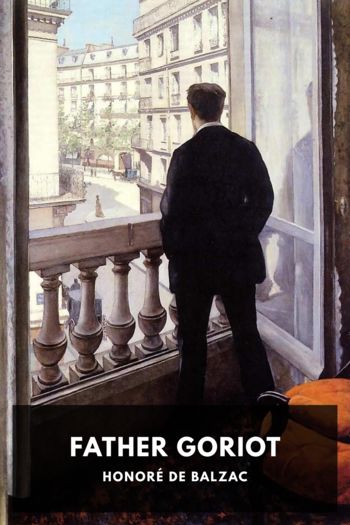Father Goriot by Honoré de Balzac (books to read for beginners txt) 📕

Description
Father Goriot, today considered one of Balzac’s most important works, is part of his novel sequence The Human Comedy. It’s the first of Balzac’s novels to feature recurring characters, a technique that he famously developed in his subsequent novels.
Set in Paris during the Bourbon Restoration of the early 1800s, Father Goriot follows Eugène de Rastignac, a student born to noble roots but little means, as he tries to climb the social ladder in Paris. The impoverished Goriot is staying at the same boardinghouse as Rastignac—and Rastignac sees opportunity in Goriot’s richly-married and elegant daughters.
The novel has been widely praised for its realist portrayal of Parisian life of various social classes, and its deep influence on French literature is still felt today. While it had chapter breaks when it was initially serialized, Balzac removed them when compiling his definitive edition of The Human Comedy, a change that is preserved in this edition.
Read free book «Father Goriot by Honoré de Balzac (books to read for beginners txt) 📕» - read online or download for free at americanlibrarybooks.com
- Author: Honoré de Balzac
Read book online «Father Goriot by Honoré de Balzac (books to read for beginners txt) 📕». Author - Honoré de Balzac
Rash resolve! He did not know that M. le Comte Maxime de Trailles would wait till he was insulted, so as to fire first and kill his man. Eugène was a sportsman and a good shot, but he had not yet hit the bulls’s eye twenty times out of twenty-two. The young Count dropped into a low chair by the hearth, took up the tongs, and made up the fire so violently and so sulkily, that Anastasie’s fair face suddenly clouded over. She turned to Eugène, with a cool, questioning glance that asked plainly, “Why do you not go?” a glance which well-bred people regard as a cue to make their exit.
Eugène assumed an amiable expression.
“Madame,” he began, “I hastened to call upon you—”
He stopped short. The door opened, and the owner of the tilbury suddenly appeared. He had left his hat outside, and did not greet the Countess; he looked meditatively at Rastignac, and held out his hand to Maxime with a cordial “Good morning,” that astonished Eugène not a little. The young provincial did not understand the amenities of a triple alliance.
“M. de Restaud,” said the Countess, introducing her husband to the law student.
Eugène bowed profoundly.
“This gentleman,” she continued, presenting Eugène to her husband, “is M. de Rastignac; he is related to Mme. la Vicomtesse de Beauséant through the Marcillacs; I had the pleasure of meeting him at her last ball.”
Related to Mme. la Vicomtesse de Beauséant through the Marcillacs! These words, on which the countess threw ever so slight an emphasis, by reason of the pride that the mistress of a house takes in showing that she only receives people of distinction as visitors in her house, produced a magical effect. The Count’s stiff manner relaxed at once as he returned the student’s bow.
“Delighted to have an opportunity of making your acquaintance,” he said.
Maxime de Trailles himself gave Eugène an uneasy glance, and suddenly dropped his insolent manner. The mighty name had all the power of a fairy’s wand; those closed compartments in the southern brain flew open again; Rastignac’s carefully drilled faculties returned. It was as if a sudden light had pierced the obscurity of this upper world of Paris, and he began to see, though everything was indistinct as yet. Mme. Vauquer’s lodging-house and Father Goriot were very far remote from his thoughts.
“I thought that the Marcillacs were extinct,” the Comte de Restaud said, addressing Eugène.
“Yes, they are extinct,” answered the law student. “My great-uncle, the Chevalier de Rastignac, married the heiress of the Marcillac family. They had only one daughter, who married the Maréchal de Clarimbault, Mme. de Beauséant’s grandfather on the mother’s side. We are the younger branch of the family, and the younger branch is all the poorer because my great-uncle, the Vice-Admiral, lost all that he had in the King’s service. The Government during the Revolution refused to admit our claims when the Compagnie des Indes was liquidated.”
“Was not your great-uncle in command of the Vengeur before 1789?”
“Yes.”
“Then he would be acquainted with my grandfather, who commanded the Warwick.”
Maxime looked at Mme. de Restaud and shrugged his shoulders, as who should say, “If he is going to discuss nautical matters with that fellow, it is all over with us.” Anastasie understood the glance that M. de Trailles gave her. With a woman’s admirable tact, she began to smile and said:
“Come with me, Maxime; I have something to say to you. We will leave you two gentlemen to sail in company on board the Warwick and the Vengeur.”
She rose to her feet and signed to Maxime to follow her, mirth and mischief in her whole attitude, and the two went in the direction of the boudoir. The morganatic couple (to use a convenient German expression which has no exact equivalent) had reached the door, when the Count interrupted himself in his talk with Eugène.
“Anastasie!” he cried pettishly, “just stay a moment, dear; you know very well that—”
“I am coming back in a minute,” she interrupted; “I have a commission for Maxime to execute, and I want to tell him about it.”
She came back almost immediately. She had noticed the inflection in her husband’s voice, and knew that it would not be safe to retire to the boudoir; like all women who are compelled to study their husbands’ characters in order to have their own way, and whose business it is to know exactly how far they can go without





Comments (0)